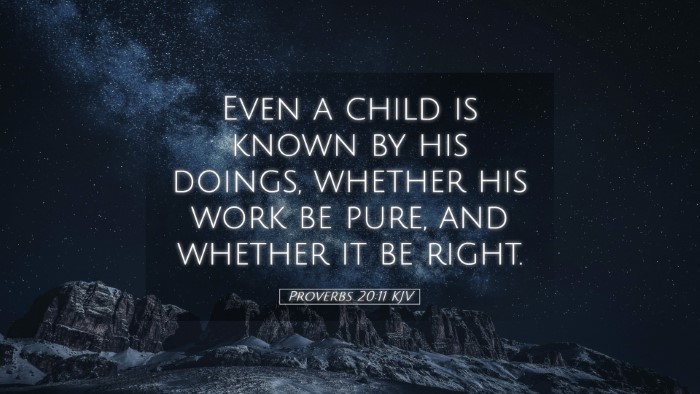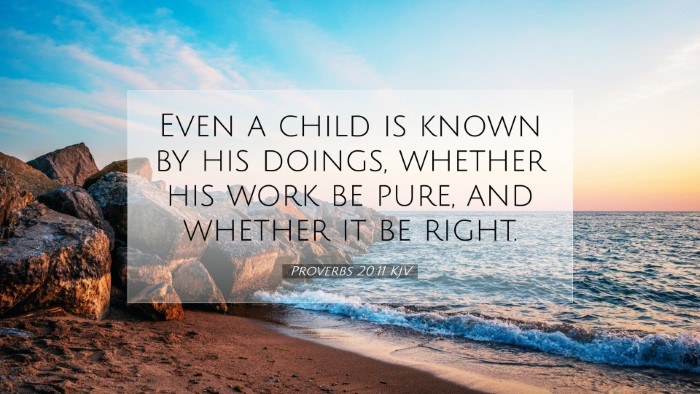Commentary on Proverbs 20:11
Verse: "Even a child is known by his doings, whether his work be pure, and whether it be right." (KJV)
The verse highlights the innate ability of human beings to demonstrate their character through their actions from a young age. This commentary will delve into the insights provided by esteemed theologians and commentators.
Introduction
Proverbs 20:11 serves as a profound reminder of the moral implications of our actions and behaviors. The assertions made in this verse are significant for believers seeking to live righteously and lead by example.
Insights from Matthew Henry
Matthew Henry notes that this verse underscores the importance of actions as reflections of one's character. Henry articulates:
- Character Revelation: Even children are not exempt from the obligation to demonstrate their virtues or vices. Their conduct provides insight into their upbringing and personal values.
- Purity and Righteousness: The distinction made between "pure" and "right" suggests that motivations and methods of achieving outcomes are equally significant. The verse invites reflection on the impact of one’s actions in both moral and ethical dimensions.
Insights from Albert Barnes
Albert Barnes offers a broader perspective on the implications of this proverb for young people and society at large:
- Social Judgment: Barnes asserts that society tends to evaluate individuals based on their behavior. Children, in particular, are an open book to observant adults. Their actions often predict future behavior and moral alignment.
- Parental Responsibility: This verse serves as a reminder for parents to guide their children towards purity and righteousness, emphasizing that early behaviors form the foundation of adult character.
Insights from Adam Clarke
Adam Clarke provides a rich exploration of the implications surrounding youthful conduct:
- Developmental Implications: Clarke explains that children’s actions offer insights into their development and nurture. It is crucial for caregivers to mold children’s behaviors towards righteousness.
- Long-Term Impact: The emphasis on purity and righteousness indicates a concern for the long-term moral implications of behavior. Children’s early actions can affect their spiritual and ethical trajectories throughout life.
Broader Implications for Pastors and Theologians
For pastors and theologians, Proverbs 20:11 serves as a key teaching point regarding spiritual development:
- Teaching to Action: The verse illustrates the need to teach congregants that faith must manifest in action. Belief is validated through right conduct.
- Fostering Accountability: Leaders in faith communities must foster environments where individuals are held accountable for their behavior—encouraging purity and righteousness as a communal effort.
Application for Students of Theology
For students studying the scriptures, the moral imperative highlighted in this verse is particularly relevant:
- Critical Examination: Students are encouraged to critically examine their own lives to identify areas where their actions align or misalign with their professed beliefs.
- Integrating Theory with Practice: This scripture offers an opportunity for students to integrate theological education with practical application in their daily lives, thus becoming effective agents of moral integrity.
Conclusion
In conclusion, Proverbs 20:11 encapsulates the essential truth that our actions reveal our true character. Whether in the realm of childhood development, ethical living, or spiritual leadership, this verse serves as a salient reminder for all believers to strive for purity and righteousness in every facet of their lives.


